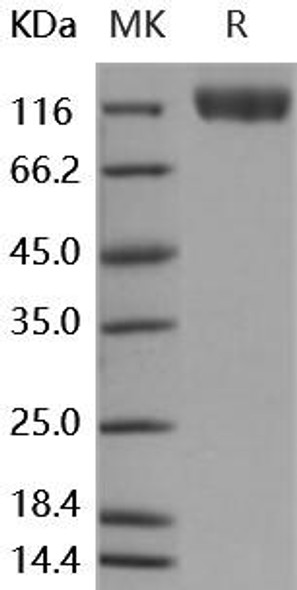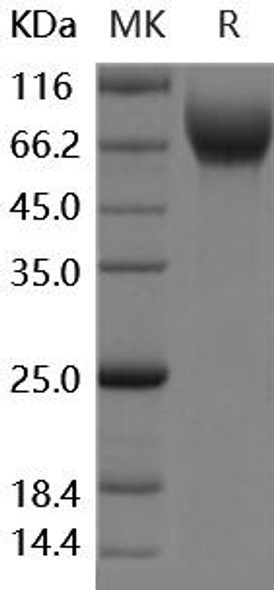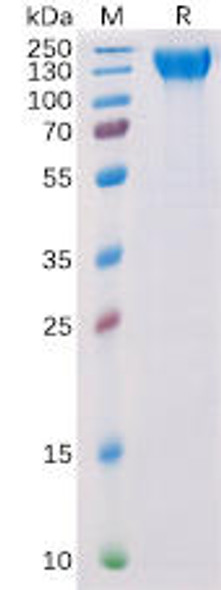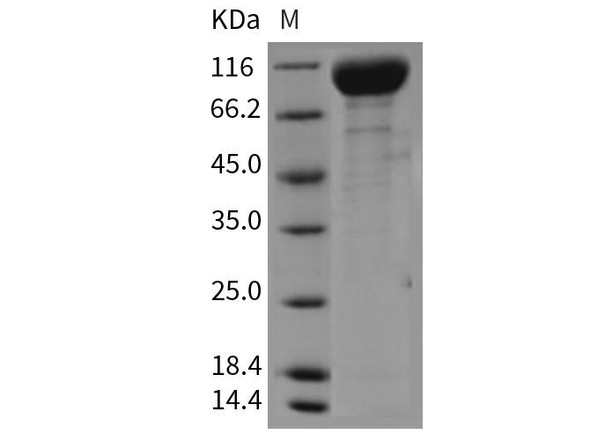Description
| Product Name: | Human VEGFR2 Recombinant Protein |
| Product Code: | RPPB2679 |
| Size: | 10µg |
| Species: | Human |
| Target: | VEGFR2 |
| Synonyms: | KDR D1-7, sKDR D1-7, Kinase insert domain receptor, Protein-tyrosine kinase receptor Flk-1, CD309, type III receptor tyrosine kinase, FLK1, VEGFR-2.� |
| Source: | Sf9 Insect cells |
| Physical Appearance: | Sterile Filtered colorless solution. |
| Formulation: | VEGFR2 solution (0.5mg/ml) contains Phosphate Buffered Saline (pH 7.4) and 10% glycerol. |
| Stability: | Store at 4°C if entire vial will be used within 2-4 weeks. Store, frozen at -20°C for longer periods of time. For long term storage it is recommended to add a carrier protein (0.1% HSA or BSA).Avoid multiple freeze-thaw cycles. |
| Purity: | Greater than 90% as determined by SDS-PAGE. |
| Amino Acid Sequence: | ADPASVGLPS VSLDLPRLSI QKDILTIKAN TTLQITCRGQ RDLDWLWPNN QSGSEQRVEV TECSDGLFCK TLTIPKVIGN DTGAYKCFYR ETDLASVIYV YVQDYRSPFI ASVSDQHGVV YITENKNKTV VIPCLGSISN LNVSLCARYP EKRFVPDGNR ISWDSKKGFT IPSYMISYAG MVFCEAKIND ESYQSIMYIV VVVGYRIYDV VLSPSHGIEL SVGEKLVLNC TARTELNVGI DFNWEYPSSK HQHKKLVNRD LKTQSGSEMK KFLSTLTIDG VTRSDQGLYT CAASSGLMTK KNSTFVRVHE KPFVAFGSGM ESLVEATVGE RVRIPAKYLG YPPPEIKWYK NGIPLESNHT IKAGHVLTIM EVSERDTGNY TVILTNPISK EKQSHVVSLV VYVPPQIGEK SLISPVDSYQ YGTTQTLTCT VYAIPPPHHI HWYWQLEEEC ANEPSQAVSV TNPYPCEEWR SVEDFQGGNK IEVNKNQFAL IEGKNKTVST LVIQAANVSA LYKCEAVNKV GRGERVISFH VTRGPEITLQ PDMQPTEQES VSLWCTADRS TFENLTWYKL GPQPLPIHVG ELPTPVCKNL DTLWKLNATM FSNSTNDILI MELKNASLQD QGDYVCLAQD RKTKKRHCVV RQLTVLERVA PTITGNLENQ TTSIGESIEV SCTASGNPPP QIMWFKDNET LVEDSGIVLK DGNRNLTIRR VRKEDEGLYT CQACSVLGCA KVEAFFIIEG AQEKTNLELE PKSCDKTHTC PPCPAPELLG GPSVFLFPPK PKDTLMISRT PEVTCVVVDV SHEDPEVKFN WYVDGVEVHN AKTKPREEQY NSTYRVVSVL TVLHQDWLNG KEYKCKVSNK ALPAPIEKTI SKAKGQPREP QVYTLPPSRD ELTKNQVSLT CLVKGFYPSD IAVEWESNGQ PENNYKTTPP VLDSDGSFFL YSKLTVDKSR WQQGNVFSCS VMHEALHNHY TQKSLSLSPG KHHHHHH |
Endothelial cells express three different vascular endothelial growth factor (VEGF) receptors, belonging to the family of receptor tyrosine kinases (RTKs). They are named VEGFR-1 (Flt-1), VEGFR-2 (KDR/Flk-1), VEGFR-3 (Flt-4). Their expression is almost exclusively restricted to endothelial cells, but VEGFR-1 can also be found on monocytes. All VEGF-receptors have seven immunoglobulin-like extracellular domains, a single transmembrane region and an intracellular split tyrosine kinase domain. VEGFR-2 has a lower affinity for VEGF than the Flt-1 receptor, but a higher signaling activity. Mitogenic activity in endothelial cells is mainly mediated by VEGFR-2 leading to their proliferation.Differential splicing of the flt-1 gene leads to the formation of a secreted, soluble variant of VEGFR-1 (sVEGFR-1). No naturally occuring, secreted forms of VEGFR-2 have so far been reported. The binding of VEGF165 to VEGFR-2 is dependent on heparin.
VEGFR2 Human Recombinant produced in Sf9 Baculovirus cells is a single, glycosylated polypeptide chain containing 987 amino acids (20-764a.a) and having a molecular mass of 110.5kDa (Molecular size on SDS-PAGE will appear at approximately 100-150kDa). VEGFR2 is fused to a 239 amino acids hIgG-His-tag at C-terminus & purified by proprietary chromatographic techniques.
| UniProt Protein Function: | VEGFR2: a receptor tyrosine kinase of the VEGFR family. High affinity receptor for VEGF and VEGF-C. Ligand binding induces autophosphorylation and activation. Activated receptor recruits proteins including Shc, GRB2, PI3K, Nck, SHP-1 and SHP-2. Plays a key role in vascular development and regulation of vascular permeability. |
| UniProt Protein Details: | Protein type:Protein kinase, TK; Kinase, protein; Membrane protein, integral; EC 2.7.10.1; Protein kinase, tyrosine (receptor); TK group; VEGFR family Chromosomal Location of Human Ortholog: 4q11-q12 Cellular Component: Golgi apparatus; endoplasmic reticulum; integral to plasma membrane; early endosome; cytoplasmic membrane-bound vesicle; extracellular region; plasma membrane; cell junction; nucleus; endosome; lipid raft; external side of plasma membrane Molecular Function:integrin binding; vascular endothelial growth factor receptor activity; protein binding; growth factor binding; protein-tyrosine kinase activity; receptor signaling protein tyrosine kinase activity; Hsp90 protein binding; transmembrane receptor protein tyrosine kinase activity; ATP binding Biological Process: extracellular matrix organization and biogenesis; positive regulation of positive chemotaxis; peptidyl-tyrosine phosphorylation; viral reproduction; protein amino acid autophosphorylation; cell maturation; calcium ion homeostasis; regulation of cell shape; positive regulation of MAPKKK cascade; positive regulation of focal adhesion formation; ovarian follicle development; positive regulation of cell proliferation; positive regulation of mesenchymal cell proliferation; angiogenesis; vasculogenesis; endothelial cell differentiation; cell fate commitment; embryonic hemopoiesis; positive regulation of phosphoinositide 3-kinase cascade; positive regulation of angiogenesis; cell migration during sprouting angiogenesis; branching morphogenesis of a tube; positive regulation of endothelial cell proliferation; positive regulation of protein amino acid phosphorylation; lymph vessel development; vascular endothelial growth factor receptor signaling pathway; alveolus development; surfactant homeostasis; transmembrane receptor protein tyrosine kinase signaling pathway; negative regulation of apoptosis; positive regulation of cell migration; positive regulation of nitric-oxide synthase biosynthetic process Disease: Hemangioma, Capillary Infantile |
| NCBI Summary: | Vascular endothelial growth factor (VEGF) is a major growth factor for endothelial cells. This gene encodes one of the two receptors of the VEGF. This receptor, known as kinase insert domain receptor, is a type III receptor tyrosine kinase. It functions as the main mediator of VEGF-induced endothelial proliferation, survival, migration, tubular morphogenesis and sprouting. The signalling and trafficking of this receptor are regulated by multiple factors, including Rab GTPase, P2Y purine nucleotide receptor, integrin alphaVbeta3, T-cell protein tyrosine phosphatase, etc.. Mutations of this gene are implicated in infantile capillary hemangiomas. [provided by RefSeq, May 2009] |
| UniProt Code: | P35968 |
| NCBI GenInfo Identifier: | 9087218 |
| NCBI Gene ID: | 3791 |
| NCBI Accession: | P35968.2 |
| UniProt Secondary Accession: | P35968,O60723, Q14178, A2RRS0, B5A925, C5IFA0, |
| UniProt Related Accession: | P35968 |
| Molecular Weight: | 79,634 Da |
| NCBI Full Name: | Vascular endothelial growth factor receptor 2 |
| NCBI Synonym Full Names: | kinase insert domain receptor (a type III receptor tyrosine kinase) |
| NCBI Official Symbol: | KDR�� |
| NCBI Official Synonym Symbols: | FLK1; CD309; VEGFR; VEGFR2�� |
| NCBI Protein Information: | vascular endothelial growth factor receptor 2; soluble VEGFR2; fetal liver kinase 1; fetal liver kinase-1; protein-tyrosine kinase receptor Flk-1; tyrosine kinase growth factor receptor |
| UniProt Protein Name: | Vascular endothelial growth factor receptor 2 |
| UniProt Synonym Protein Names: | Fetal liver kinase 1; FLK-1; Kinase insert domain receptor; KDR; Protein-tyrosine kinase receptor flk-1; CD_antigen: CD309 |
| Protein Family: | Vascular endothelial growth factor receptor |
| UniProt Gene Name: | KDR�� |
| UniProt Entry Name: | VGFR2_HUMAN |









